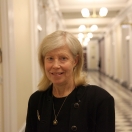
Ed. Note: Champions of Change is a weekly initiative to highlight Americans who are making an impact in their communities and helping our country rise to meet the many challenges of the 21st century.
On October 13, 2011, I was honored to be among the Champions of Change recognized for their work on access to justice in America. The occasion directed much needed attention to an increasingly urgent social problem.
It is a shameful irony that the nation with the highest concentration of lawyers has so frequently failed to make legal services available to those who need them most. For decades, bar studies have estimated that over four fifths of the legal needs of the poor and a majority of the needs of middle-income Americans remain unmet. The recent recession has widened this justice gap. High rates of unemployment, bankruptcies, foreclosures, and reductions in social services have created more demands for legal representation at the same time that many of its providers have faced cutbacks in their own budgets. As a consequence, legal aid and public interest programs are being asked to do more with less.
In this context, the need for greater research and education about access to justice assumes increasing importance. To allocate scarce funds wisely, we need better information about unmet legal problems, the gaps in service provision, and the cost-effectiveness of possible responses, including pro bono work and qualified non-lawyer assistance. To build a coalition for progress, we also need a profession and public that are more informed about what passes for justice among the have nots.
Legal academics should become more involved in these efforts. To that end, Stanford’s Center on the Legal Profession has sponsored four national forums on access to justice and pro bono service. It has also supported creation of a Consortium on Access to Justice, which is helping to sponsor teaching initiatives and interdisciplinary research projects. Among the efforts are a website clearinghouse with materials for integrating issues involving the justice gap into law school curricula and related programs. A research task force is developing collaborative projects that will bring together scholars from different institutions and disciplinary backgrounds to focus on unmet needs and strategies for addressing them. The Center has also sponsored an International Association of Legal Ethics. Under its umbrella, legal experts from around the globe explore shared concerns, including access to justice. Learning how other nations deliver effective assistance to those who cannot afford it encourages innovation here and abroad.
Equal Justice Under Law is one of society’s most proudly proclaimed and widely violated legal principles. It embellishes courthouse doors, but seldom describes what goes on inside them. Institutions such as the Center on the Legal Profession and the Access to Justice Consortium are part of the struggle necessary to narrow the gap between rhetoric and reality of in our legal system.
Deborah L. Rhode is the Ernest W. McFarland Professor of Law at Stanford Law School and Director of the Stanford Center on the Legal Profession.



